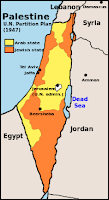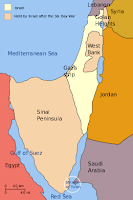He said, "If you listen carefully to
the LORD your God and do what is right in his eyes, if you pay attention to his
commands and keep all his decrees, I will not bring on you any of the diseases
I brought on the Egyptians, for I am the LORD, who heals you."
Exodus 15:26
Today is Rosh Chodesh (beginning of the month of) Iyar. The
Hebrew work Iyar ((אייר is an acronym for the
Hebrew phraseאני ה' רופאך(I am the Lord who
heals you). It is believed that the month of Iyar is propitious month for
healing. Iyar is also known as the month of shining or blossoming (זיו).
At the time of the exodus from Egypt
about 3350 year ago, which we just celebrated through the Holiday of Passover,
the first Rosh Chodesh Iyar fell on Shabbat and found Bnai Yisrael at the
waters of Marah. After wandering for a week after passing through the waters of
Yam Suf where their Egyptian pursuers died, Bnai Yisrael finally came upon
water in the vast desert, only to find it undrinkable. Moshe Rabbenu turned to
G-d to find out what to do, and G-d told Moshe that if he threw a branch of a
nearby growing tree – which in itself was bitter – into the water, the water
would become sweet. (Exodus 15:22-26)
There are many questions that can be asked about this episode.
Why didn't G-d just go poof and make the water sweet? Why didn't G-d just
provide sweet water to start with? And maybe the most puzzling, how is it that
something bitter (the branch) added to something else bitter (the water) makes
the water sweet. And why did Moshe have to throw the branch into the water. Why
didn’t G-d just blow it in Himself?
There are many explanations for these questions, but the one
I'm going for, for now is this: Sometimes in order to achieve sweetness, we
need a dose of bitterness. And sometimes we have to do it ourselves. In other
words, some great things don't come easy. Think birth.
Since the disengagement/desertion/expulsion from the
settlements in Gaza and the Northern
Shomron in the summer of 2005, there has been some debate within
the religious-Zionist communities whether or not Israel Independence Day (Yom
HaAzmaut) should be celebrated, and even whether the State of Israel is indeed
the beginning of the redemption as described by Rav Kook. These days, these
debates have an added urgency in light of the fact that seemingly more and more
Jews, while seemingly advocating a ‘two-state solution’, have as their goal the
further destruction of more Jewish communities in Yehuda and Shomron, and the
'disengagement' of more and more Jews in Israel from their roots. How can we
celebrate the birth of a state that sometimes seems to celebrate the
destruction of Jewish enterprise and Zionism?
The Rambam says that the one difference between the beginning
of the Messianic age (the age of redemption) and normal times is the
sovereignty of Israel .
There will not necessarily be great miracles such as seas parting, or food
falling from the sky, there will not necessarily even be peace, but the fact
that Israel is
sovereign in its Land will be the sign that the beginning of the redemption has
come.
Rabbi Akiva believed that Bar Kochva was the Messiah. Bar Kochva was not known to be a particularly charming fellow.
Mitzvot were not always high on his to-do list. He was big and strong, and a
great and brave general and warrior. But he never changed water into blood, nor
was he a Talmid Chacham – a great scholar. Yet, Rabbi Akiva (and other great
Rabbis of the day) believed – until Bar-Kochva’s death – that he was Mashiach.
What caused them to believe this? The answer is that Bar Kochva liberated Judea
from its Roman conquerors for a short period of time. And Rabbi Akiva knew that
a sign of the beginning of the redemption is sovereignty of the Jews in Eretz
Yisrael.
On the face of it, the establishment of the State of Israel in
1948 was a long, difficult, and man-made process. Thousands died from disease
and Arab terrorism. Jews lived and worked in cruel and bitter times. Many Jews
feel today that the establishment of the State was due to the hard work of the
people. And this is true. We, like Moshe Rabbeinu, are required to do the work.
But let's take a look at how the establishment came about, what miracles it
took for this to happen.
After the Holocaust, then American President Harry Truman
wanted the British to allow more Jewish refugees to come to Palestine .
The British didn't want that and turned to the UN for an answer. Instead of
siding with the British against more Jewish Aliyah, the UN voted on a partition
plan. Just the fact that the vote itself took place was a miracle. But the fact
that the vote passed – with East and West both voting for –was openly G-d's
hand. And what other State on the face of the earth was given independence so
that people who didn’t live in it, and had never been there, could return
to it.
Now let's take a look at the partition plan itself. The original
plan left out of the Jewish state the towns of Nahariya, Ramle-Lod, Beersheva
and much of the Galilee . It left Jerusalem
as an "international city" under the auspices of the UN. It left
completely indefensible borders, a state too small for its citizens. Yet, the
Jewish leaders accepted this plan, wanting only a state of their own, no matter
what the price.
 |
| UN partition plan |
Let's remember what happened. On ו אייר
תש"ח, May 15, 1948
– the day after Israel
announced its sovereignty, five Arab armies invaded Israel ,
despite the desire of the Jews to live in peace in a truncated state. And
despite the Arab superiority in numbers and arms, resources and land, despite
the world's ambivalence towards Israel even though they had voted for the
state, despite all those odds, Israel won that war, and succeeded in expanding
the borders to include Ramle-Lod, and Nahariya, and Beer Sheva, all of the Galilee
and at least a small part of Jerusalem. If the Arabs hadn’t attacked, I
wouldn’t be living where I’m living now. How can we interpret this as anything
but a miracle?
6000 people died in that war, יהי זכרם ברוך, one tenth of Israel's population at the time, but from that
great bitterness came the sweetness of independence, the chance for Israel
to come home to their Land. A miracle happened when a part of Bnai Yisrael
returned to a part of Eretz Yisrael and became a sovereign nation.
 |
| Ceasefire lines after the War of Independence (note - not borders) |
Let’s skip forward 19 years to June of 1967. For weeks before,
Arab radio was broadcasting the imminent destruction of the State of Israel.
They described how Jewish blood would flow into the sea. Around the world, the international
media was already writing obituaries for the Jewish state. But early one
morning in June, within one hour, the Israeli air force, maybe one tenth the
size of the combined Arab Air Forces, managed to wipe out just about all of both
the Egyptian and Syrian fighter planes. With ownership of the skies, the Israeli
Defense Forces conquered territory undreamed of only a few weeks earlier. And
then, if this was not miracle enough, another. Despite begging Jordan to stay
out of the fight, King Hussein decided to believe the false reports coming from
Cairo, that Tel Aviv was about to fall, and all “Palestine” would soon be in
Arab hands. Wanting to get in on the spoils, Hussein attacked.
There were no plans of entering Jerusalem .
The IDF had no provisions for entering Hebron ,
or Beit Lechem, or Gush Etzion. But pushed into an unwanted war, Israeli
soldiers entered and liberated these holy places. Tears running down their
faces, these kids – few religious, almost none had ever seen the Kotel, or knew
of the sacredness of Hebron – ran,
unheeding of the bullets that were flying around them. Some spark, some genetic
memory made them go on, to liberate those places which had never left their
hearts.
 |
| Lines after the Six-Day War |
The miracles continue. During the Yom Kippur war in 1973, soldiers
deployed on the Golan reported that Syrian troops were advancing and, being
seriously outnumbered, they had no way of stopping them. The Israelis were
afraid that the Syrians would overrun them, and conquer Teveriah and all the
Galil. And suddenly, to the astonishment of the soldiers, the Syrian tanks
stopped. After a while they turned around and retreated. The reason? Lt. Col. Yossi Ben-Hanan, one of Israel
Three years after the greatest chilul HaShem – the
destruction of European Jewry – came the greatest Kiddush HaShem – the
establishment of the State of Israel in a part of the Land
of Israel Ben-Gurion University Israel
and the flag of the University, both at half-mast. My eyes teared and
overflowed at the thought of all that was lost. But looking again at the flags,
I realized what a miracle it all was. Here I was, sitting in a University,
whose student body totals more than three times the entire 1948
population of Beer Sheva, a city that was not even supposed to be a part of the
state.
Heartrending, unbearable bitterness.
Miraculous sweetness.
Wishing everyone a month of healing and blossoming, and a month to shine.

No comments:
Post a Comment